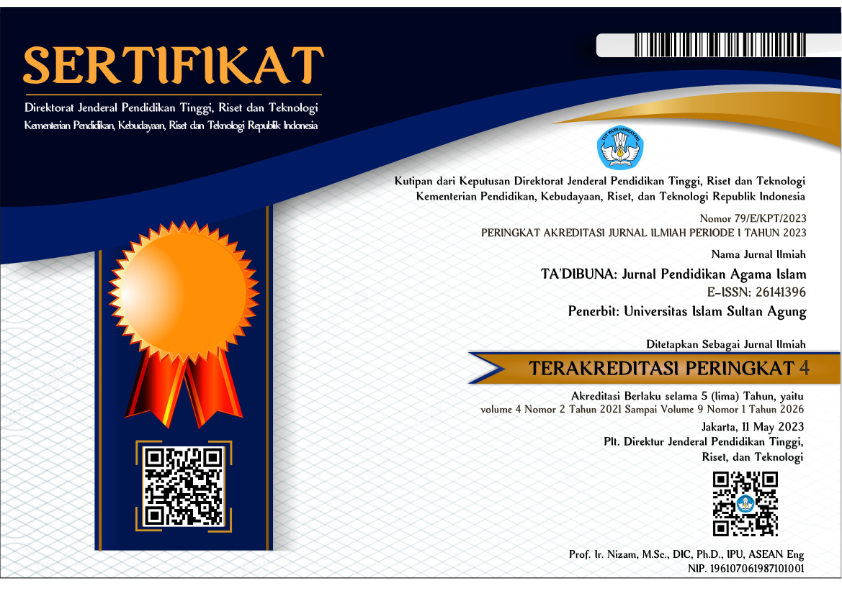Development of Artificial Intelligence-Based PAI Learning Assessment: Opportunities and Challenges at MTs Durul Jazil
Abstract
Full Text:
PDFReferences
Adedo, E., & Deriwanto, D. (2024). The Development of Digital Media and Its Utilization in Islamic Religious Education Learning. Doctoral Dissertation, Curup State Islamic Institute.
Alamin, Z. (2023). IMPROVING ISLAMIC EDUCATION THROUGH THE USE OF ARTIFICIAL INTELLIGENCE-BASED EDUCATION PLATFORMS. Creative: Journal of Islamic Religious Education Thought, 21(1), 14–22.
Annisa, N., Nurdin, N., & Syahid, A. (2024). Integration of Technology and Human Artificial Intelligence in Improving Islamic Education. Proceedings of Islamic Studies and Integration of Knowledge in the Era Society (KIIIES), 3(1), 316–322.
Bainar. (2024). Opportunities and Challenges of Digitalization for Islamic Religious Education. Baitul Hikmah: Islamic Scientific Journal, 2(2), 74–80.
Binanto, I. (2020). Implementation of PAI Learning Assessment through Computer Based Test at SMK Negeri 7 Bandung City. Journal of Islamic Religious Education Al-Thariqah, 4(2).
Bungawati, B. (2022). Opportunities and challenges of the independent learning curriculum towards the era of society 5.0. Journal of Education, 31(3), 381–388.
Fadhilah, U., & Lizawati, L. (2023). The Influence of Google Classroom Online Media on Nursing Student Satisfaction in English Lectures. J-LELC: Journal of Language Education, Linguistics, and Culture, 3(2), 122–128.
Fadli, M. R. (2021). Understand the design of qualitative research methods. Humanities, Scientific Studies of General Courses, 21(1), 33–54.
Fajirah Lubis, I., Az-Zahra, F., Tanjung, L. H. F., Firmansyah, R., & Gunawan, I. (2024). Analysis of the Implementation of Information System Security at Kartika Private High School 1-4. Journal of Computer Science Research, 2(2), 45–51.
Hakeu, F., & Djahuno, R. (2024). Transformation of Artificial Intelligence in the Context of Islamic Religious Education Learning at Al-Azhfar Integrated MTs North Gorontalo. Tarqiyah: Journal of Islamic Education, 2(1), 11–23.
Hartono, B. (2024). Artificial Intelligence Technology and the Importance of Adapting in the Way of Learning. Indonesian Education Bulletin, 3(2), 80–86.
Kushariyadi, Kushariyadi, et al. (2024). Artificial Intelligence: Dynamics of AI Development and Its Application. PT. Sonpedia Publishing Indonesia.
Labobar, J., & Malatuny, Y. G. (2024). ARTIFICIAL INTELLIGENCE: Challenges in civics learning. Civics Education and Social Science Journal (CESSJ), 6(1), 39–50.
Mahesa, F. (2024). ARTIFICIAL INTELLIGENCE IN EDUCATION: OPPORTUNITIES AND CHALLENGES OF ITS USE FOR PERSONALIZATION OF LEARNING. Scholars: Journal of Education and Teaching, 2(6), 146–152.
Majid. A. (2017). Qualitative Research Data Analysis. East Aksara Publisher.
Mantara, R. (2024). Artificial intelligence in the development of computer systems that usually require human intelligence. Urnal Informatics Multi, 2(4), 144–151.
Misbah, W. A., & Mariyam, S. (2024). The Urgency of Islamic Religious Education in Improving the Spiritual Intelligence of Grade VIII Students at Alfa Sanah Cisauk Junior High School. Ikhlas: Scientific Journal of Islamic Education, 1(4), 38–47.
Mu'minah, I. H., & Gaffar, A. A. (2020). The use of google classroom-based e-learning as a biology learning medium. Proceedings of the National Seminar on Education, 2, 800–816.
Oktavianus, A. J. E., Naibaho, L., & Rantung, D. A. (2023). The Utilization of Artificial Intelligence in Learning and Assessment in the Digitalization Era. Journal of Science and Technology Cridatama, 5(2), 437–486.
Parnawi, A., & Ridho, D. A. A. (2023). The Role of Islamic Religious Education Teachers in Instilling Moral and Ethical Values of Students at SMK Negeri 4 Batam. Berajah Journal, 3(1), 167–178.
Rahmawati, S. N. E., Hasanah, M., Rohmah, A., Pratama, R. A. P., & Anshori, M. I. (2023). Privacy and ethics in digital human resource management. Lokawati: Journal of Research Management and Research Innovation, 1(6), 01–23.
Ramdhan, M. (2021). Research Methods. Cipta Media Nusantara.
Rohman, A. (2021). A Practical Guide to Online Learning with Google Classroom and Google Meet. Elex Media Komputindo.
Soegiarto, Ita, et al. (2023). Artificial Intelligences (AI) Technology-Based Learning Innovation in Official Schools in the Era of Industrial Revolution 4.0 and Society 5. O. Innovative: Journal Of Social Science Research, 3(5), 10546–10555.
Sutarto, S. (2022). DEVELOPMENT OF AN INFORMATION TECHNOLOGY (IT)-BASED ISLAMIC RELIGIOUS EDUCATION EVALUATION SYSTEM. Berajah Journal, 2(3), 719–730.
Wardani, Febri Pramudya, et al. (2024). The Evolution of Education in the Singularity Era: Facing the Opportunities and Challenges of Future Technologies. Indonesian Journal of Economic & Management Sciences, 2(4), 687–702.
Wibowo, H. S. (2023). Development of Learning Media Technology: Designing Innovative and Effective Learning Experiences. Oyster Media.
Wibowo, M. U., & Ariany, R. L. (2024). The Impact of Artificial Intelligence in the Assessment and Evaluation of Student Learning Outcomes. Mount Djati Conference Series, 40, 40–51.
DOI: http://dx.doi.org/10.30659/jpai.7.2.192-202
Refbacks
- There are currently no refbacks.
Â
Ta'dibuna: Jurnal Pendidikan Agama Islam is published by Master Program of Islamic Education, Faculty of Islamic Studies, Universitas Islam Sultan Agung (UNISSULA), Indonesia.
Jl. Raya Kaligawe Km.4, PO BOX 1054/SM Semarang, Indonesia 50112. Email: jurnaltadibuna@unissula.ac.id.ÂÂ






